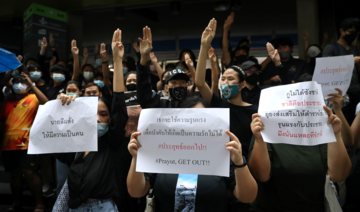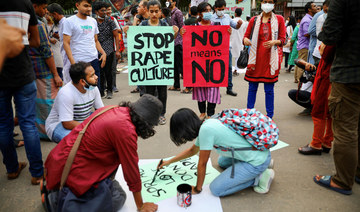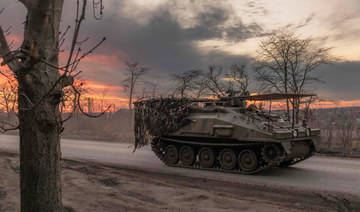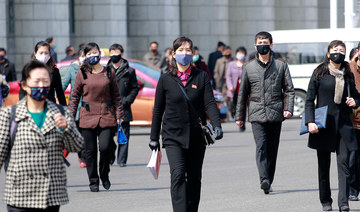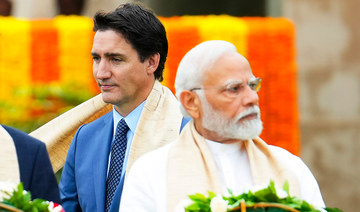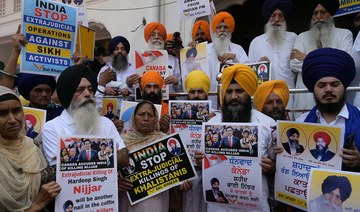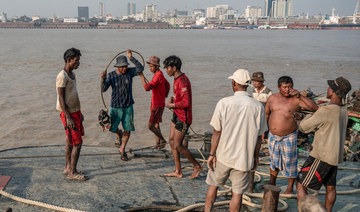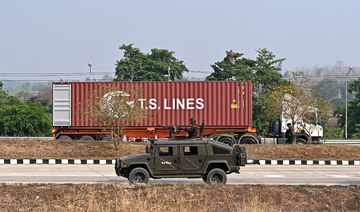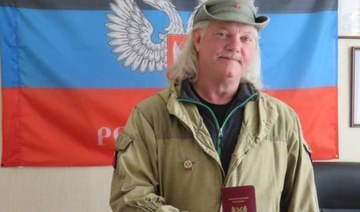DHAKA: Bangladesh garment factory owner Shahidullah Azim laid off 20% of his workers in the wake of the first wave of the coronavirus pandemic. Now watching the second wave build in Europe and the United States, Azim is staring at “an unprecedented crisis.”
He’s not alone. Bangladesh is the world’s second-largest apparel producer after China, but its industry leaders say international retailers are either refraining from placing orders, delaying buying decisions or demanding steep price cuts.
“This is a disaster. We are taking orders just to survive,” said Siddiqur Rahman, a garment supplier to international retailers including H&M and GAP Inc.
“We anticipated orders could look up before the Christmas but that didn’t happen.”
Rahman said customers were demanding price cuts of as much as 15%, making the recovery that much harder.
In the financial year that ended in June, Bangladesh’s garment exports totaled $27.94 billion, down 18% from the previous year.
There was a rebound of less than 1% in the July-September quarter, thanks to a surge in demand for knitwear items, which account for half of Bangladesh’s total garment exports.
But nearly half of factories producing knitwear products like t-shirts and sweaters are finding it difficult to remain open, said Selim Osman, president of the Bangladesh Knitwear Manufacturers and Exporters Association.
“A second wave could further delay the recovery,” Osman said.
Low wages have helped Bangladesh build its garment industry, with some 4,000 factories employing 4 million workers. Readymade garments are a mainstay of the economy, contributing almost 16% of country’s GDP, according to the central bank.
Factory owner Azim, who supplies European and North American retailers, says he has been forced to cut one-in-five jobs.
“That’s the case for most of the factories,” he said. “Now the second wave has started. We don’t know what future holds for us.”
Experts fear the South Asian country might itself face another surge in infections during the winter, having so far confirmed 390,206 cases, including 5,681 deaths.
About a third of the one million workers who were either furloughed or laid off have been rehired since July, according to union leaders.
But many workers are struggling without overtime pay, which often accounts for 20% of their monthly income.
“Without overtime, it is too difficult to meet expenses,” said Banesa Begum, a worker in Gazipur, on the outskirt of the capital city Dhaka.
“I just pray that my factory gets more orders so that we can survive.”
Bangladesh garment workers pray for orders as pandemic shreds exports
https://arab.news/p4uz7
Bangladesh garment workers pray for orders as pandemic shreds exports
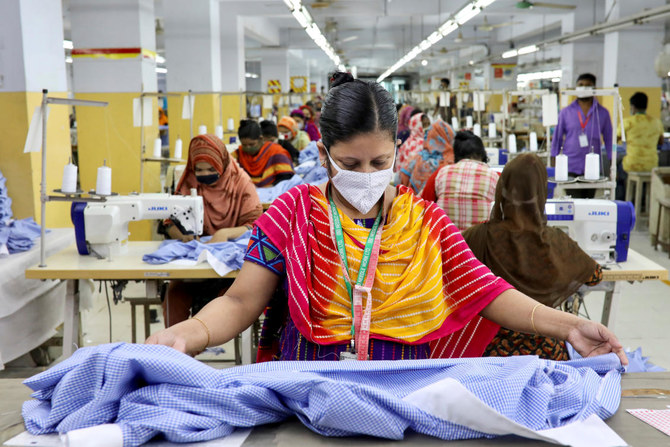
- A garment supplier said customers were demanding price cuts of as much as 15%
- In the financial year that ended in June Bangladesh’s garment exports totaled $27.94 billion
Russia warns French troops legitimate targets if they are sent to Ukraine
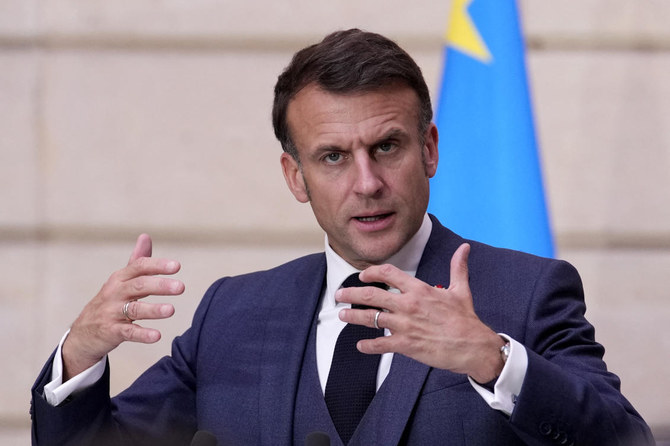
- French president Emmanuel Macron caused controversy in February by saying he could not rule out the deployment of ground troops in Ukraine in the future
MOSCOW: Russia warned France on Wednesday that if President Emmanuel Macron sent troops to Ukraine then they would be seen as legitimate targets by the Russian military.
Macron caused controversy in February by saying he could not rule out the deployment of ground troops in Ukraine in the future. The French leader warned that if Russia wins in Ukraine then Europe’s credibility will be reduced to zero.
“It is characteristic that Macron himself explains this rhetoric with the desire to create some kind of ‘strategic uncertainty’ for Russia,” Russian Foreign Ministry Spokeswoman Maria Zakharova told reporters.
“We have to disappoint him — for us the situation looks more than certain,” Zakharova said.
“If the French appear in the conflict zone, they will inevitably become targets for the Russian armed forces. It seems to me that Paris already has proof of this.”
Zakharova said Russia was already seeing growing numbers of French nationals among those killed in Ukraine.
Russia said on Monday it would practice the deployment of tactical nuclear weapons as part of a military exercise after what the Moscow said were threats from France, Britain and the United States.
AstraZeneca says withdraws Covid vaccine ‘for commercial reasons’

LONDON: British drugmaker AstraZeneca said Wednesday that it has withdrawn its Covid vaccine Vaxzevria, one of the first produced in the pandemic, citing “commercial reasons” and a surplus of updated jabs.
“As multiple, variant Covid-19 vaccines have since been developed there is a surplus of available updated vaccines. This has led to a decline in demand for Vaxzevria, which is no longer being manufactured or supplied,” an AstraZeneca spokeperson said.
3 Indian men charged with killing Sikh separatist leader in Canada appear in court
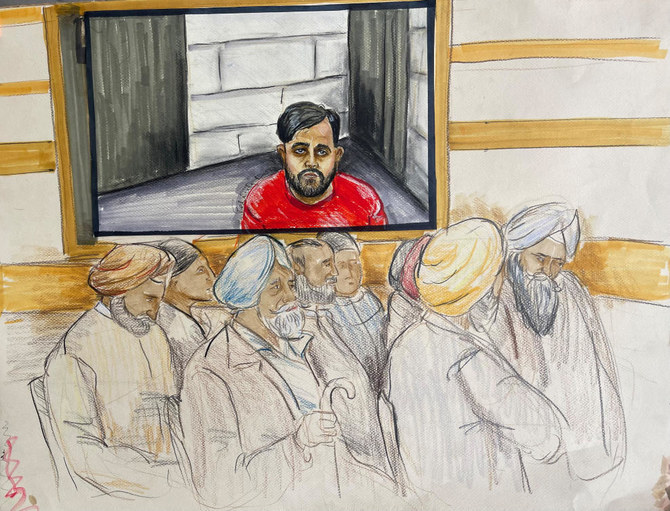
SURREY, British Columbia: Three Indian men charged with killing Sikh separatist leader Hardeep Singh Nijjar in British Columbia last year have appeared in court in the case that set off a diplomatic spat after Canadian Prime Minister Justin Trudeau said there were “credible allegations” of Indian involvement.
Canadian police had arrested the three Indian men last week in Edmonton, Alberta, and they have been charged with first-degree murder and conspiracy to commit murder.
Canadian Mounted Police Superintendent Mandeep Mooker said Friday that the investigation into whether the men had ties to India’s government was ongoing.
Nijjar, 45, was shot to death in his pickup truck last June after he left the Sikh temple he led in the city of Surrey. An Indian-born citizen of Canada, he owned a plumbing business and was a leader in what remains of a once-strong movement to create an independent Sikh homeland. India designated him a terrorist in 2020 and at the time of his death had been seeking his arrest for alleged involvement in an attack on a Hindu priest.
India has denied involvement in the slaying. In response to the allegations, India told Canada last year to remove 41 of its 62 diplomats in the country. Tensions remain but have somewhat eased since.
The arrested men — Kamalpreet Singh, 22, Karan Brar, 22, and Karanpreet Singh, 28 — appeared in court Tuesday via a video link and agreed to a trial in English. They were ordered to appear in British Columbia Provincial Court again on May 21.
Brar and Karanpreet Singh appeared in the morning. Kamalpreet’s appearance was delayed until the afternoon as he waited to speak to a lawyer.
The small provincial courtroom was filled with spectators during the morning session. Others crowded into an overflow room to watch the proceedings via video.
Richard Fowler, the defense lawyer representing Brar, said the case will eventually be moved to the Supreme Court and combined into one case.
About 100 people gathered outside the courthouse waving yellow flags and holding photos of Indian government officials whom they accuse of being involved in Nijjar’s killing.
Canadian police say the three suspects had been living in Canada as non-permanent residents.
A bloody decadelong Sikh insurgency shook north India in the 1970s and 1980s until it was crushed in a government crackdown in which thousands of people were killed, including prominent Sikh leaders.
The Khalistan homeland movement has lost much of its political power but still has supporters in the Indian state of Punjab, as well as in the sizable overseas Sikh diaspora. While the active insurgency ended years ago, the Indian government has repeatedly warned that Sikh separatists were trying to make a comeback.
UN: Myanmar displaced now at 3 million
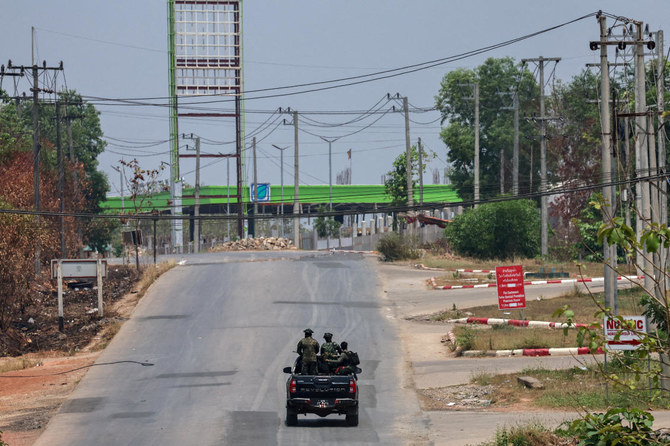
- An estimated one-third of those displaced are children, according to the UN statement
YANGON: The number of displaced people in Myanmar has reached three million, the United Nations said, the vast majority forced to flee their homes by conflict unleashed by the military’s 2021 coup.
Around 2.7 million have fled since the putsch that toppled Aung San Suu Kyi’s government after a short-lived experiment with democracy.
The coup sparked renewed clashes with established ethnic armed groups and birthed dozens of new “People’s Defense Forces” that the military has failed to crush.
“Myanmar stands at the precipice in 2024 with a deepening humanitarian crisis,” the UN’s resident coordinator in the country said in a statement released on Monday.
An estimated one-third of those displaced are children, according to the statement.
Around half of the three million have been displaced since late last year, when an alliance of ethnic armed groups launched an offensive across northern Shan state, the statement said.
The offensive seized swathes of territory and lucrative trade crossings on the China border, posing the biggest threat to the junta since it seized power.
Myanmar’s borderlands are home to a plethora of ethnic armed groups, many of whom have battled the military since independence from Britain in 1948 over autonomy and control of lucrative resources.
The UN said a severe funding shortfall was hampering its relief efforts, particularly ahead of the May-June cyclone season.
Last year cyclone Mocha smashed into western Myanmar’s Rakhine state, killing at least 148 people.
More than 355,000 people are currently displaced in western Rakhine state, which has been rocked since November by clashes between the Arakan Army and the military, the UN said.
Russian court says US soldier charged with theft causing ‘significant’ damage

- Detention of Gordon Black presents yet another diplomatic headache for the US
- The US soldier was detained in early May in Vladivostok, in Russia’s Far East
MOSCOW: US soldier Gordon Black, who has been detained the Russian city of Vladivostok until July 2, has been charged with theft causing significant damage, a Russian court said.
The detention of Black, who the Pentagon said traveled to Russia without authorization, presents yet another diplomatic headache for the United States, which has warned US citizens against all travel to Russia.
He was detained in early May in Vladivostok, in Russia’s Far East.
The Pervomaisky District Court of Vladivostok said in a statement that it had decided on the preventive measure to detain Black until July 2 for “secretly stealing the property of citizen T., causing the latter significant damage.”
“When choosing the preventive measure in the form of detention, the court came to the conclusion that US citizen B. (Black) — under the weight of the charges — could hide from the preliminary investigation authorities and the court to avoid responsibility,” the court said in the statement.
Earlier, the court’s press service identified the soldier as Gordon Black.
The Russian interior ministry in Vladivostok said on Tuesday that a 32-year-old woman had filed a complaint against the 34-year-old suspect.
The two had met in South Korea. The American had come to Vladivostok to visit her, the two had an argument, and she later filed a police report accusing him of stealing money, it said. He was arrested in a local hotel, having bought a plane ticket to return home.
The Pentagon said on Tuesday that before his arrest in Russia, Black not only broke Army rules by traveling to the Russian city of Vladivostok without authorization, but he did so after passing through China.



